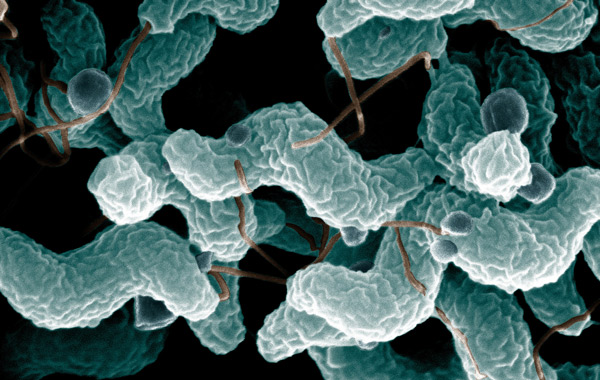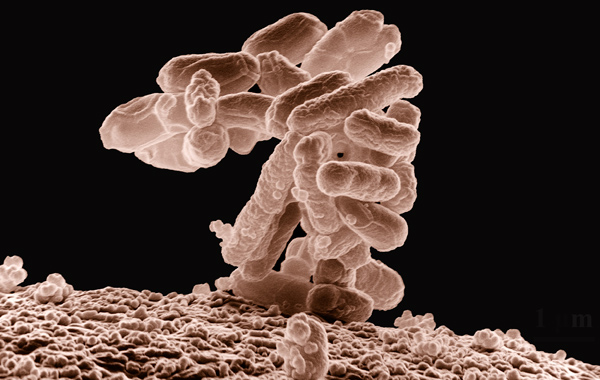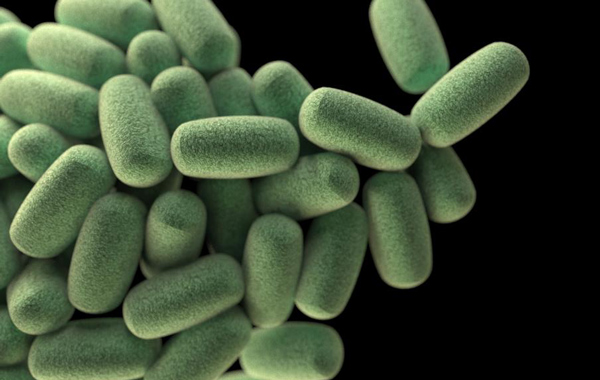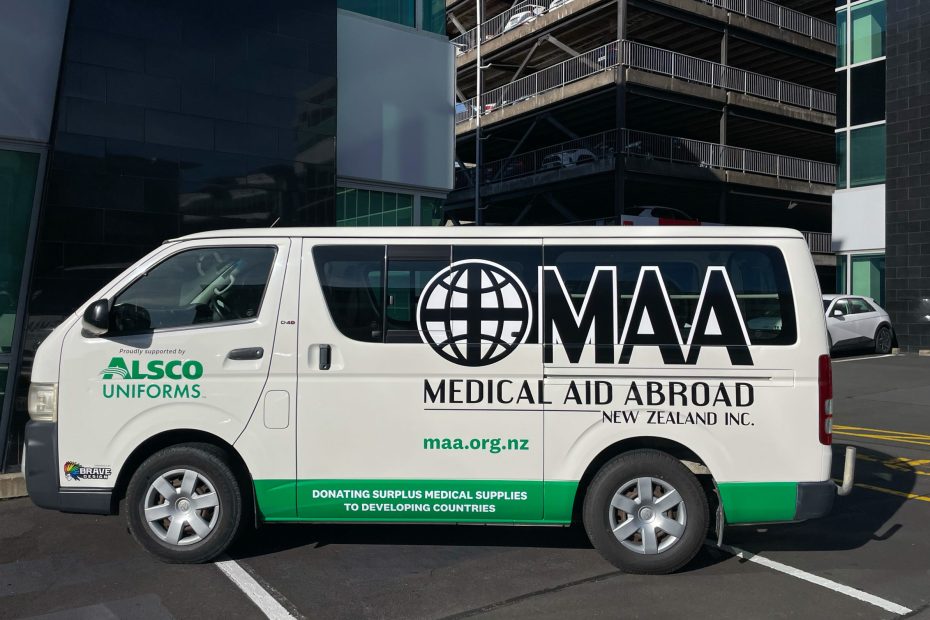Bacteria, fungi, and viruses are in your restaurant kitchen right now. They are unavoidable.
And you know what?
They are multiplying much faster than you might think.
In fact, bacteria can multiply over 16 million times in just eight hours. And as Rutvik Oza puts it:
“Happiness and bacteria have one thing in common; they multiply by dividing!”
You probably have at one time or another become sick after eating some food. This is what is known as food poisoning or foodborne illnesses.
Bacteria are the primary sources of foodborne illnesses, and its symptoms include:
- Feeling weak
- Nausea
- Fever
- Stomach pain
- Headache
- Diarrhoea
- Vomiting
Any of these symptoms can prevent your patrons from coming back to your restaurant. This is why, at Alsco, we recommend you always maintain a clean restaurant kitchen.

The health of your staff and customers should always be your priority. Here are the seven harmful bacteria lurking in your kitchen.
Salmonella
Salmonella is a type of bacteria that mostly causes food-related illnesses, such as typhoid fever and gastroenteritis.
Most of the deaths related to salmonella infection affect the young, the very old, and people with weak immune systems.
These bacteria live in the intestines, faeces, and bowel of human beings and animals.
How Salmonella Spreads In the Kitchen
Some sources of salmonella in the kitchen include:
- Raw and undercooked eggs
- Inadequately cooked poultry or meats
- Unpasteurised dairy products, such as raw milk or cheese
- Unpasteurised fruit juice
- Salads
- Fruits and vegetables
The bacterium gets into other foods in the kitchen through cross-contamination. This can be through hands, utensils and kitchen equipment.
How to Stop the Spread of Salmonella in Your Restaurant’s Kitchen
- Keep raw meat and chicken separate from other raw kitchen ingredients.
- At all times, ensure you keep cooked and raw foods separate.
- Use a food thermometer to ensure meat poultry or any other foods are thoroughly cooked.
- Clean and sanitise food preparation areas regularly.
Campylobacter
Campylobacter is a spiral-shaped bacteria that is found in animals, like dogs, cattle, cats, poultry. It’s an infection of the gut (digestive tract).

About half of all reported bacteria-related gastrointestinal infections are due to campylobacter infection. Each year about 33 million people die from these bacteria throughout the world.
How Campylobacter Spreads In the Kitchen
Campylobacter bacteria spread through:
- Eating undercooked meat or chicken.
- Drinking unpasteurised milk.
- Eating any other food that has been cross-contaminated.
- Handling raw meat, young pets and other animals.
- Person-to-person spread.
Person-to-person spread occurs when people get in contact with microscopic amounts of an ill person’s faeces. These kinds of spread happen when people touch contaminated surfaces.
How to Stop the Spread of Campylobacter in Your Restaurant’s Kitchen
- Keep raw food away from ready-to-eat foods to prevent cross-contamination.
- Always store meat below cooked foods in the refrigerator.
- Use separate knives and chopping boards for ready-to-eat and raw foods.
- Cook poultry and meat to a temperature of 75°C (or till its meat juice is not pink).
- Keep hot foods above 60°C and cold foods below 5°C.
Staphylococcus Aureus
Staphylococcus aureus is a spherical, gram-positive bacteria that cause a wide range of infections. Approximately 25% of animals and people suffer from staphylococcus aureus.
These bacteria cause:
- Furuncles (boils), carbuncles, cellulitis folliculitis
- Minor skin infection
- Meningitis or brain infection
- Osteomyelitis or bone infection
- Endocarditis or heart infection
How Staphylococcus Aureus Spreads in the Kitchen
- People carrying the bacteria can spread it to food if they don’t wash their hands.
- Direct contact with infected persons.
- Inhaling infected dispersed sneeze or cough droplets.
How to Stop the Spread of Staphylococcus in Your Restaurant’s Kitchen
- Cooking foods thoroughly to over 75°C.
- Use a food thermometer for cooking.
- Wash your hands with soap and water before and after handling food.
- In case of any wounds, infections on your wrists or hands, wear gloves when preparing food.
Escherichia Coli (E. Coli)

Escherichia Coli is a gram-negative bacteria. It’s rod-shaped and commonly found in the lower intestine of both humans and animals.
Although this bacteria is mostly harmless, some people are at a greater risk of having complications. These categories of people include:
- Pregnant mothers
- Young children
- Old people
- People with weakened immune systems
How E. Coli Spreads in the Kitchen
Since this bacterium lives in the intestine of animals like goats, cattle and sheep, it can be passed directly from meat or milk. Therefore, E. coli can be spread through:
- Improper handling and processing of meat
- Unpasteurised milk
- Contaminated fruits and vegetables
How to Stop the Spread of E. Coli in Your Restaurant’s Kitchen
- Wash your hands with soap and warm water for at least 20 seconds.
- Always separate raw meat and other foods.
- Cook food thoroughly.
- Wash raw fruits and vegetables with soapy water.
Listeria
Listeria infection is a serious foodborne bacterial illness that is commonly caused by the consumption of improperly processed deli meat or unpasteurised milk.
About 1,600 people suffer from listeria infections every year. Just like E.coli, the infection usually affects:
- Newborns
- Pregnant women
- People with weakened immune systems
- Older adults
How Listeria Spreads in the Kitchen
Sources of Listeria in the kitchen include:
- Unpasteurised dairy products like cheese
- Sliced deli meats
- Hot dogs
- Deli-prepared salads
Whenever people inject any of these contaminated foods, they spread the bacteria.
How to Stop Listeria Spreading in Your Restaurant’s Kitchen
- Use ready-to-eat and precooked foods as soon as you can.
- Avoid having raw milk in the kitchen.
- Wash vegetables and fruits thoroughly.
- Avoid refrigerated smoked seafood.
Clostridium Botulinum
Clostridium botulinum is a bacterium that produces botulinum toxins in low oxygen conditions. These toxins cause muscular paralysis and respiratory problems because they block nerve functions. Botulinum toxins are some of the most life-threatening substances.
How Clostridium Botulinum Spreads in the Kitchen
In the kitchen, this bacteria can be spread through poor handling of:
- Canned foods
- Meat products, such as sausage and ham
- Canned tuna fish
- Preserved vegetables and fruits of low acid content
How to Stop the Spread of Clostridium Botulinum in Your Restaurant’s Kitchen
- Practice hygiene standards when handling canned foods.
- Never taste canned food products to determine if they are still good. Instead, throw away all cans that appear damaged, leaked or bulging.
- Ensure oils are infused with herbs or garlic in the kitchen refrigerator.
Clostridium Perfringens
C. perfringens is a spore-forming anaerobic bacteria that commonly resides in newborns and adults. The ingestion of contaminated food causes C. perfringens.

How Clostridium Perfringens Spreads in the Kitchen
Temperature abuse is the leading cause of transmission of these bacteria. This is the reason slow cooling of cooked foods before serving customers has been associated with its outbreaks.
How to Stop the Spread of Clostridium Perfringens in Your Restaurant’s Kitchen
- Cook food at the right temperature.
- Refrigerate leftovers below 5°C.
- Reheat leftover food to at least 75°C.
- Throw away any food if you are in doubt
What Is The Solution to These Harmful Bacteria?
Poor hygiene and cleaning practices can cause food contamination and the speed of infection in your restaurant.
But there are a few steps your staff can follow to ensure your restaurant kitchen is bacteria-free. Some of these steps include:
- Ensure their work area is clean.
- Keep themselves clean.
- Cook food properly.
- Store food in the right places before and after cooking.
However, most restaurant employees don’t follow some of these steps. This is why you need regular Alsco hygiene services to get rid of bacteria from your kitchen.
It’s worth noting that your restaurant hygiene has a direct impact on the morale and health of your employees.
Your restaurant kitchen should always remain spotlessly clean and sanitary. Contact Alsco New Zealand for expert deep cleaning services.





